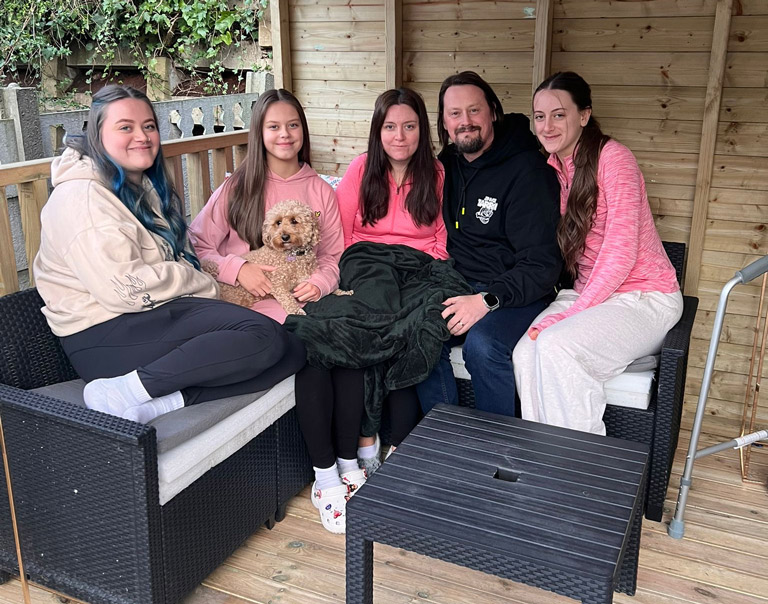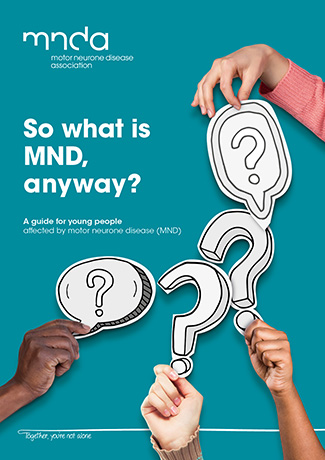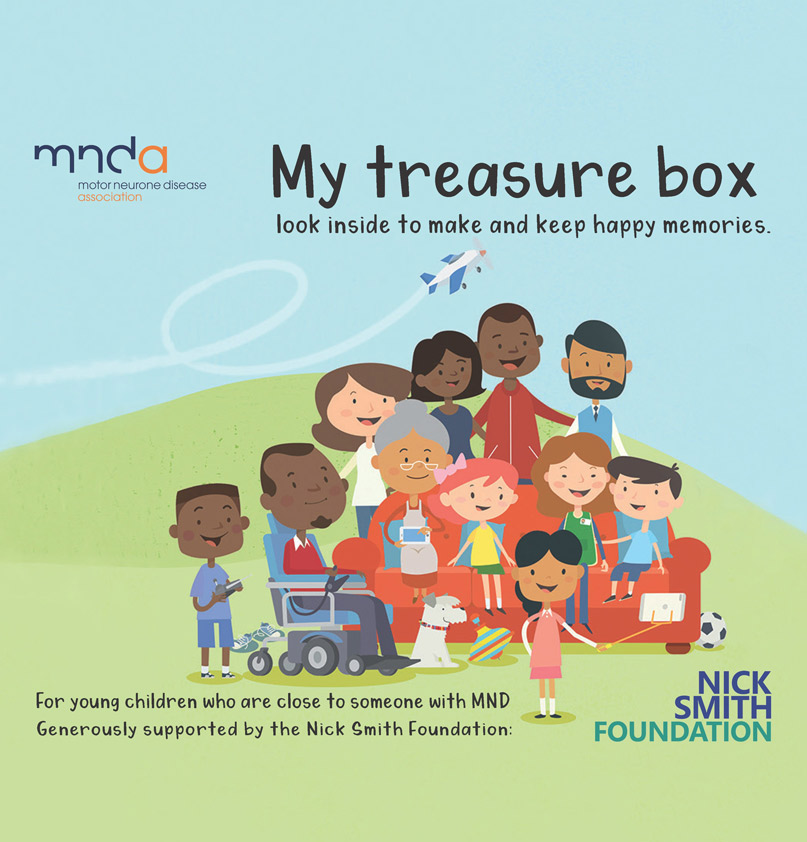Find support below for young people affected by MND aged 11 to 18.
If you're close to someone with motor neurone disease (MND), you are not alone - we're here to help.
Where can I get information about MND?
"If I had to go through it again, I'd want to know the background about the disease and the how and why. Also what happens next?"
If someone close to you has been diagnosed with MND, you may want to know what to expect. Our information can help.
So what is MND, anyway?
If you are aged up to 18, our guide So what is MND, anyway? explains the disease and how you can get support, especially if you help with care tasks. It also includes pages to make notes.
For a printed copy of the guide, contact our MND Connect helpline.
We also provide a web app of the guide This works like an app from an app store, but can be used on a wide range of mobile devices and platforms. It's free, but best to download using Wi-Fi as it needs about 5MB of space. Instructions for download are provided when you open the web app (if downloads are not covered in your mobile contract, you may be charged).
My Memory Box
This box of gifts and activities can help you communicate about MND and build positive memories about the person you love with MND. The box can be personalised. To receive a Memory Box, contact cyp@mndassociation.org
Resources for younger children
If you have younger sisters and brothers, see our page for children aged 4 to 10, which explores the following resources:
MND Buddies
Our activity hub MND Buddies can help young children find out about MND in a gentle way, through games and stories.
Storybook - Why are things changing?
Our storybook Why are things changing? features families affected by MND. The three stories can be listened to on the MND Buddies activity hub (see above). Order a free printed copy of the storybook from our MND Connect helpline: telephone: 0808 802 6262 or email: mndconnect@mndassociation.org
Workbook - When someone close has MND
When young children ask for more detail, adults can order our activity workbook When someone close has MND from our MND Connect helpline: telephone: 0808 802 6262 or email: mndconnect@mndassociation.org This is only available in hardcopy, as the drawing activities are designed for a trusted adult to help children work out ways to cope with their feelings.
My Treasure Box
Like My Memory Box, our Treasure Box has gifts and activities, but for younger children. It can help them communicate and create positive memories about the person they love with MND. To receive a Treasure Box, contact cyp@mndassociation.org
Information for parents and guardians
See our page for parents and guardians affected by MND. Teachers, social workers and professionals who provide support may also find this useful when helping children or young people close to someone with MND.
What support is available for young people affected by MND?
"Letting things out is so important. Just tell someone if it gets bad and why you're feeling that way. Don't struggle with everything in silence."
Why do I need support?
If someone close to you has motor neurone disease (MND), you may live with them, or nearby, and things change with MND. You may help with a few tasks or you may be their main carer while going to school or work. This can feel difficult and emotional.
"MND has a gradual drip-drip effect, but it's life changing. Things like a stairlift going in, rails and handles, and a seat in the shower...'
As MND symptoms get worse, someone with MND needs increasing amounts of care. You may need help support from care workers who can visit the person at home. Contact our MND Connect helpline for guidance: telephone: 0808 802 6262 or email: mndconnect@mndassociation.org
We also offer family counselling in partnership with Barnardo's, to support children and young people affected by MND or Kennedy's disease. To find out more, contact cyp@mndassociation.org
Can I get any financial help?
We offer grants to help young people close to someone with MND. Other MND Support Grants are available for people with MND and for adult carers. A member of your family or a health and social care professional can apply for a grant on your behalf. Or contact our MND Connect helpline, telephone: 0808 802 6262 or email: mndconnect@mndassociation.org
Up to £250 can be awarded to a young person in any one year. You can use the grant in lots of ways. For example, to help pay for:
- a laptop or smartphone
- a day out with your family to build a special memory
- decoration of your room to create a calm environment.
"The thing that helped the most was spending as much time as I could with my dad to build some very special memories with him."
Can I get support at school or college?
Most schools and colleges have teachers or staff who act as contacts for young carers or young people affected by illness in their family. Find out who this contact is at your school or college, or talk things over with a teacher of your choice. Once they know that you need support, they can discuss your needs and how best to help you.
Teachers and other support professionals may find it useful to visit our page for parents and guardians. Our information can help them understand your needs and how to provide effective support.
Can I get support from people of my own age?
Sometimes, even if your own friends are supportive, it can help to meet other young people in a similar situation to yourself.
"Maybe do some kind of activity with others who understand how you feel. Doing something positive helps to take you away from sadness or loss, and you feel you're accomplishing something too...Then you rebuild a sense of who you are as a person and what you're capable of doing."
Find out about events for children and young people, that are run by the MND Association, by emailing cyp@mndassociation.org
The annual Young Carers Festival is run by The Children's Society who offer support for young carers. The festival provides lots of activities and time for you. You need permission from your parent or guardian to attend. You also need to be a member of a young carers project or school group. Tell your school, college or university if you are a young carer, as they can help find a young carers group near you.
How can I get involved?
"You can do something positive, even when the situation seems as bad as it can get."
If you'd like to get involved, there are many ways to do this with the MND Association, and with your local branches and groups.
If you're interested in any of the options on this page, email: cyp@mndassociation.org
Fundraising
See our fundraising events to find out more about the type of activities on offer. Some events may be suitable for schools and colleges. We may be able to provide guidance for teachers or youth leaders.
Campaigning or volunteering
If you're over 16 and you'd like to help people living with MND get the support they need, you may enjoy becoming a young campaigner or young volunteer. We have branches and groups across the UK who provide a warm welcome to families who'd like to get involved.
See also our web pages about campaigning and volunteering if you would like to find out more.
Where can I find out more about services for children and young people?
Find suggestions below to help you search for organisations that support children and young people.
Contact our MND Connect helpline for guidance about MND support services, telephone: 0808 802 6262 or email: mndconnect@mndassociation.org
"The fact that your helpline can be contacted by young people as well as adults is the best part. You're here for us too."
To find out about our own services for children and young people, contact cyp@mndassociation.org
We also provide links to wider organisations that may help parents and guardians affected by MND.
Urgent support
Emergency Services - Tel: 999
For ambulance, police or fire services.
Urgent health advice in England - Tel: 111
For urgent, but non-emergency health advice.
Urgent health advice in Northern Ireland
This online page will help you find out-of-hours medical guidance.
Urgent health advice in Wales - Tel: 111
For urgent, but non-emergency health advice.
Emotional support for children and young people
Childline - Tel: 0800 1111
24-hour emotional support, offering confidential live chat.
Hope Support Services - Tel: 01989 566317
Online emotional support for children and young people aged 11 and over facing a family health crisis offering Skype, email, one to one and peer support. Email: help@hopesupportservices.org.uk
Kooth
Online chat with qualified counsellors.
Student Minds
Emotional wellbeing support for students.
Young Minds - Tel: 0808 802 5544
Support for the emotional wellbeing and mental health of children and young people. Mon- Fri 9.30am – 4pm Email: ymenquiries@youngminds.org.uk
The Mix
An online guide to life for 16-25 year olds in the UK, offering non-judgemental support and information.
Support for young carers
Carers Trust
Support for carers and young carers. Email: support@carers.org
Go Beyond- Tel: 01822 811020
Free respite breaks for disadvantaged children, including young carers, from all over the UK. Email: info@chicks.org.uk
The Children's Society - Tel: 0300 303 7000
Help for young carers with details about the annual Young Carers Festival and young carers' groups on the website.
Bereavement support for children and young people
Winston's Wish - Tel: 08452 030405
Support for bereaved children, young people and their families.
Child Bereavement UK - Tel: 08000 288840
Support to help families rebuild their lives when someone close to them dies. Email: support@childbereavementuk.org
Hope Again - Tel: 08444 779400
Support, advice and information for children, young people and adults when someone close to them dies. Email: helpline@cruse.org.uk
Grief Encounter - Tel: 02083 718455
Bereavement support for children and young people. Email: support@griefencounter.org.uk and ecounselling@griefencounter.org.uk
Messages from other young people affected by MND
Here are a few messages from other young people who have experienced MND in their family. You can find more in our information for young people.
Finding a way through
"You need someone to tell you it will be okay in the end. Not that there will be a cure or anything, but that you will find a way to get through the sadness and live your own life. Because you will."
"There are positives, you just have to look for them and appreciate them for what they are. Special moments, new skills, learning how to deal with difficult situations - these are all things you can carry with you in life."
Becoming stronger
"I can go into survival mode really easily now. You learn to look after yourself and other people."
"I never want to let go of the emotions I've been through, because they made me who I am. And I like who I am."
"I'm stronger now because of everything that happened...and I think it's true for my whole family now."
It's okay to feel down
"I think we all feel a bit lonely and isolated when MND hits our family. It's easy to feel angry and guilty too, but it's not so strange really is it? Let yourself off the hook a bit."
"Someone I trusted told me it was okay to feel angry or show that I was upset. You can read things like that all day long, but it doesn't quite sink in. He gave me permission to show my feelings, which really helped."
Being you
"If MND has taught me anything, it is firstly that it is fine to laugh at the things you laughed at before."
"It's hard, but through all of this, you cannot let it stop you making your own choices and getting on with life."
"Take a deep breath in every now and then, and make the most of whatever is going on."
"It helps knowing other people are going through similar things and feel the same way."
"It's important to do normal stuff like hang out with your friends, otherwise it's not a normal life."
Tell us your thoughts on this web page
Page last updated: 28 February 2025
Next full review: February 2027


